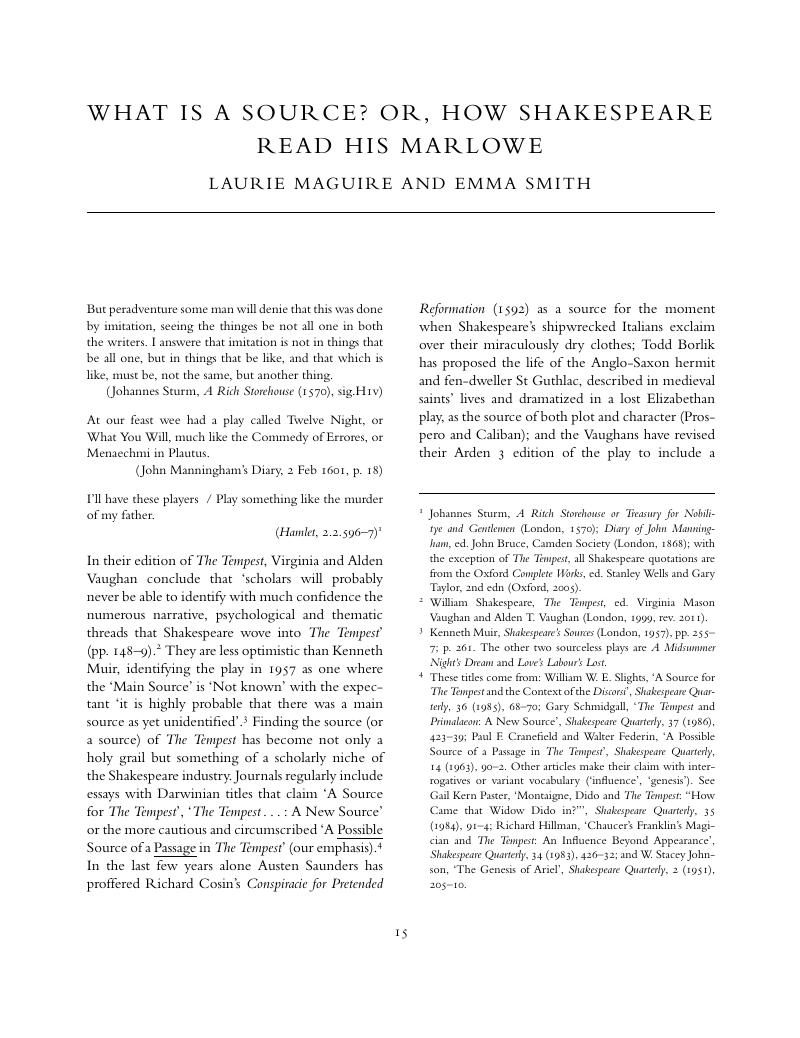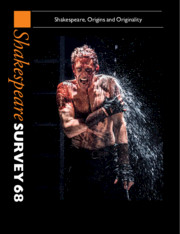Book contents
- Shakespeare Survey68Shakespeare, Origins and Originality
- Advisory Board
- Shakespeare Survey
- Copyright page
- Editor’s Note
- Contributors
- Contents
- Illustrations
- Shakespeare's anecdotal character
- What is a source? Or, how Shakespeare read his Marlowe
- Imitation or collaboration? Marlowe and the early Shakespeare canon
- ‘O Jephthah, judge of Israel’: from original to accreted meanings in Hamlet's allusion
- The elephants’ graveyard revisited: Shakespeare at work inAntony and Cleopatra,Romeo and JulietandAll's Well That Ends Well
- ‘Every like is not the same’: translating Shakespeare in Spanish today
- Reading Originals by the Light of Translations
- ‘My Name is Will’: Shakespeare's Sonnets and Autobiography
- Tracings and data inThe Tempest:author, world and representation
- Shakespearian Gesture: Narrative and Iconography
- The Origin of the Late Renaissance Dramatic Convention of Self-Addressed Speech
- Reading in their present: Early readers and the origins of Shakespearian appropriation
- Shakespeare out of time (or, Hugo takes dictation from the beyond)
- Betrayal, Derail, or a Thin Veil: The Myth of Origin
- Global Shakespeares, Affective Histories, Cultural Memories
- Spinach and Tobacco: making Shakespearian unoriginals
- Ren Fest Shakespeare: the Cosplay Bard
- ‘Dead as earth’: contemporary topicality and myths of origin inKing LearandThe Shadow King
- Shakespeare and the idea of national theatres
- John Rice and the boys of the Jacobean King's Men
- Shakespeare's Irish lives: the politics of biography
- Shakespeare in blockaded Berlin: the 1948 ‘Elizabethan Festival’
- Connecting the Globe: Actors, Audience and Entrainment
- ‘Freetown!’: Shakespeare and Social Flourishing
- We'll always have Paris: the third household and the ‘bed of death’ inRomeo and Juliet
- The ‘serpent of old Nile’: Cleopatra and the pragmatics of reported speech
- ‘This insubstantial pageant faded’: the drama of semiotic anxiety inThe Tempest
- Shakespeare performances in England 2014
- Professional Shakespeare Productions in the British Isles January–December 2013
- The Year's Contribution to Shakespeare Studies
- Index
What is a source? Or, how Shakespeare read his Marlowe
Published online by Cambridge University Press: 05 November 2015
- Shakespeare Survey68Shakespeare, Origins and Originality
- Advisory Board
- Shakespeare Survey
- Copyright page
- Editor’s Note
- Contributors
- Contents
- Illustrations
- Shakespeare's anecdotal character
- What is a source? Or, how Shakespeare read his Marlowe
- Imitation or collaboration? Marlowe and the early Shakespeare canon
- ‘O Jephthah, judge of Israel’: from original to accreted meanings in Hamlet's allusion
- The elephants’ graveyard revisited: Shakespeare at work inAntony and Cleopatra,Romeo and JulietandAll's Well That Ends Well
- ‘Every like is not the same’: translating Shakespeare in Spanish today
- Reading Originals by the Light of Translations
- ‘My Name is Will’: Shakespeare's Sonnets and Autobiography
- Tracings and data inThe Tempest:author, world and representation
- Shakespearian Gesture: Narrative and Iconography
- The Origin of the Late Renaissance Dramatic Convention of Self-Addressed Speech
- Reading in their present: Early readers and the origins of Shakespearian appropriation
- Shakespeare out of time (or, Hugo takes dictation from the beyond)
- Betrayal, Derail, or a Thin Veil: The Myth of Origin
- Global Shakespeares, Affective Histories, Cultural Memories
- Spinach and Tobacco: making Shakespearian unoriginals
- Ren Fest Shakespeare: the Cosplay Bard
- ‘Dead as earth’: contemporary topicality and myths of origin inKing LearandThe Shadow King
- Shakespeare and the idea of national theatres
- John Rice and the boys of the Jacobean King's Men
- Shakespeare's Irish lives: the politics of biography
- Shakespeare in blockaded Berlin: the 1948 ‘Elizabethan Festival’
- Connecting the Globe: Actors, Audience and Entrainment
- ‘Freetown!’: Shakespeare and Social Flourishing
- We'll always have Paris: the third household and the ‘bed of death’ inRomeo and Juliet
- The ‘serpent of old Nile’: Cleopatra and the pragmatics of reported speech
- ‘This insubstantial pageant faded’: the drama of semiotic anxiety inThe Tempest
- Shakespeare performances in England 2014
- Professional Shakespeare Productions in the British Isles January–December 2013
- The Year's Contribution to Shakespeare Studies
- Index
Summary

- Type
- Chapter
- Information
- Shakespeare Survey , pp. 15 - 31Publisher: Cambridge University PressPrint publication year: 2015
- 3
- Cited by

